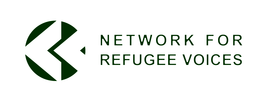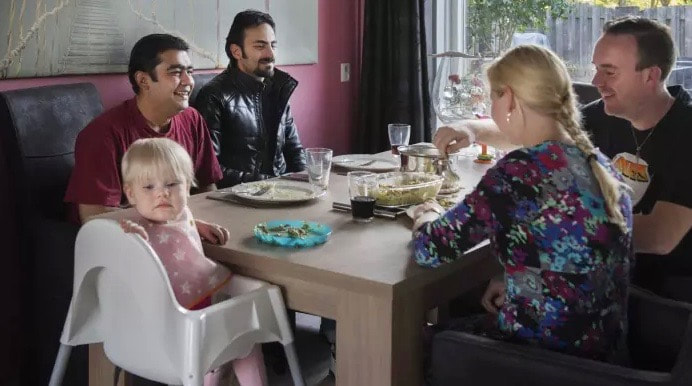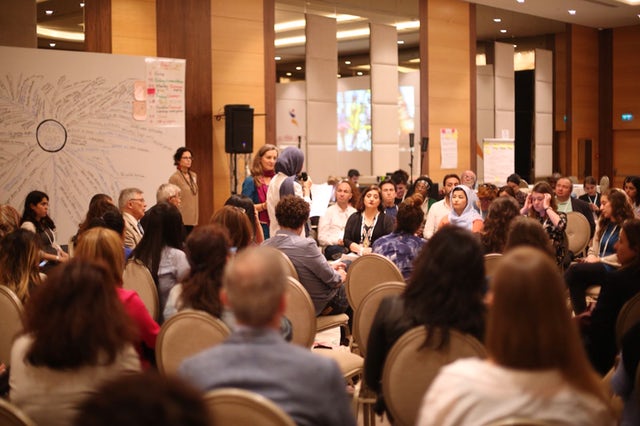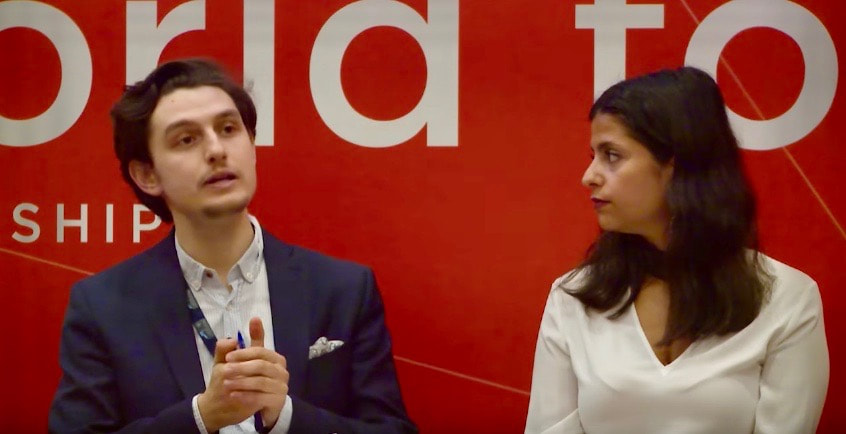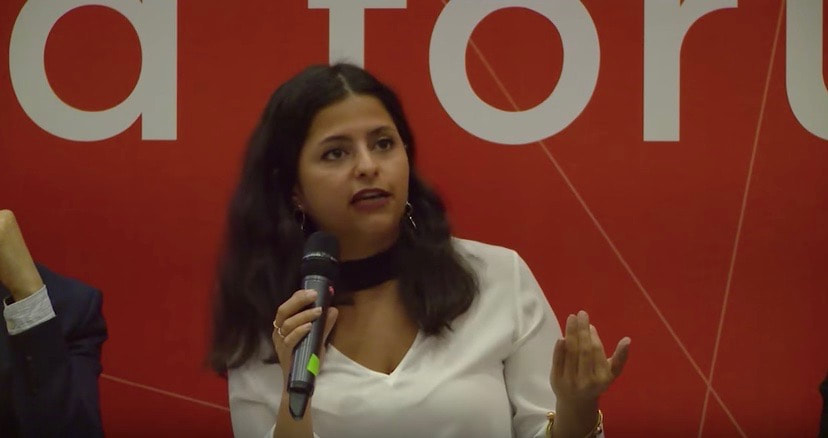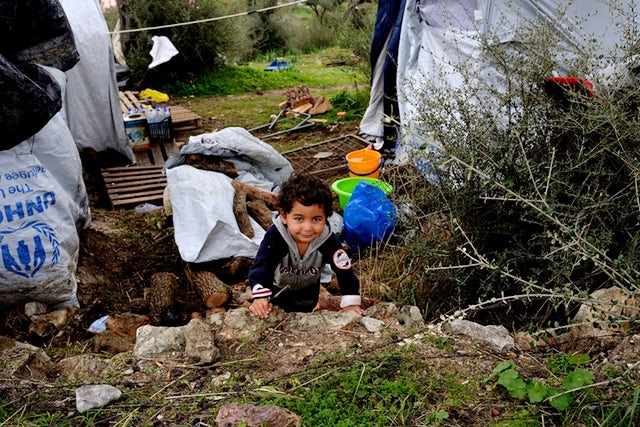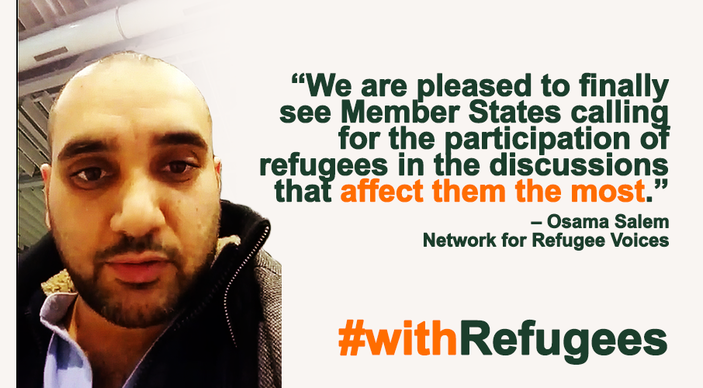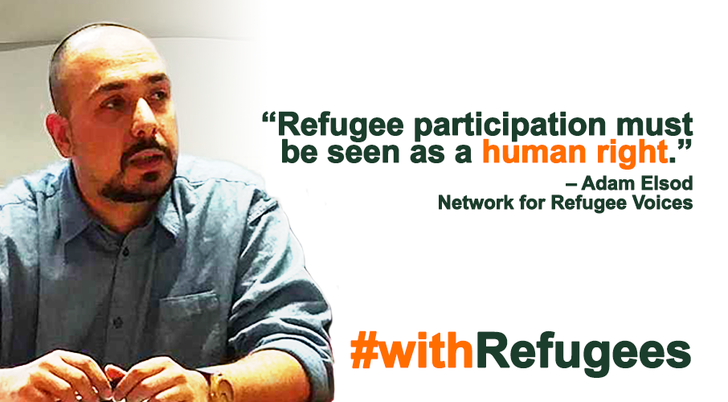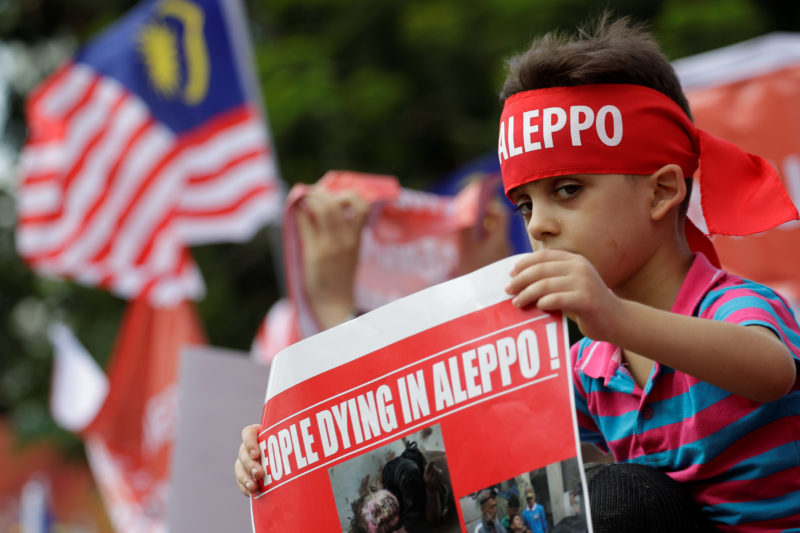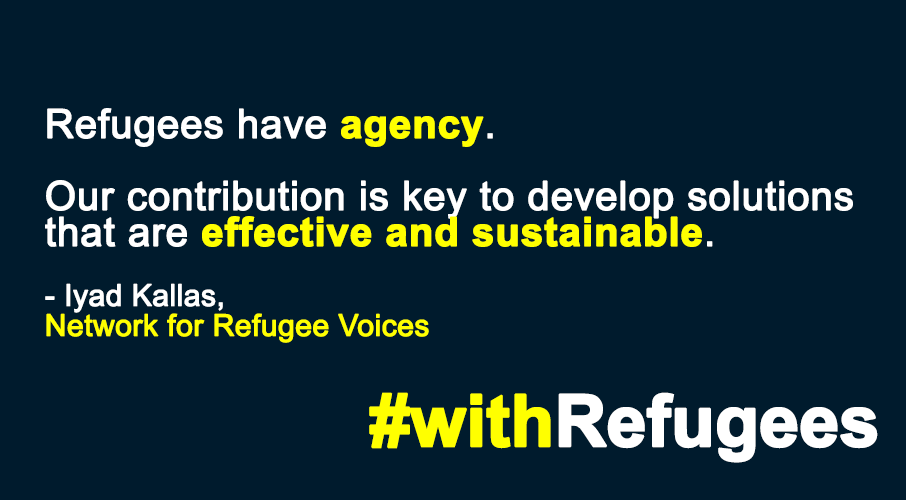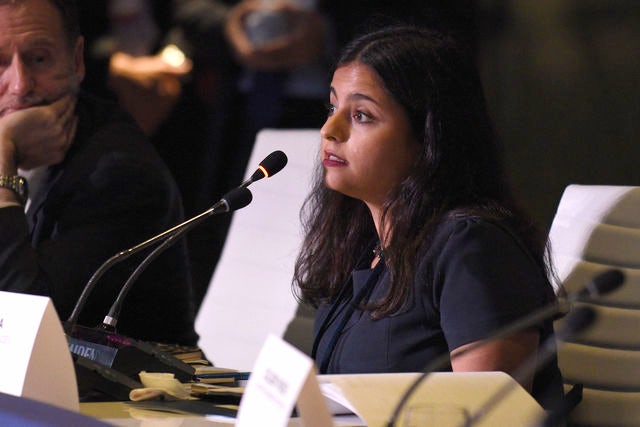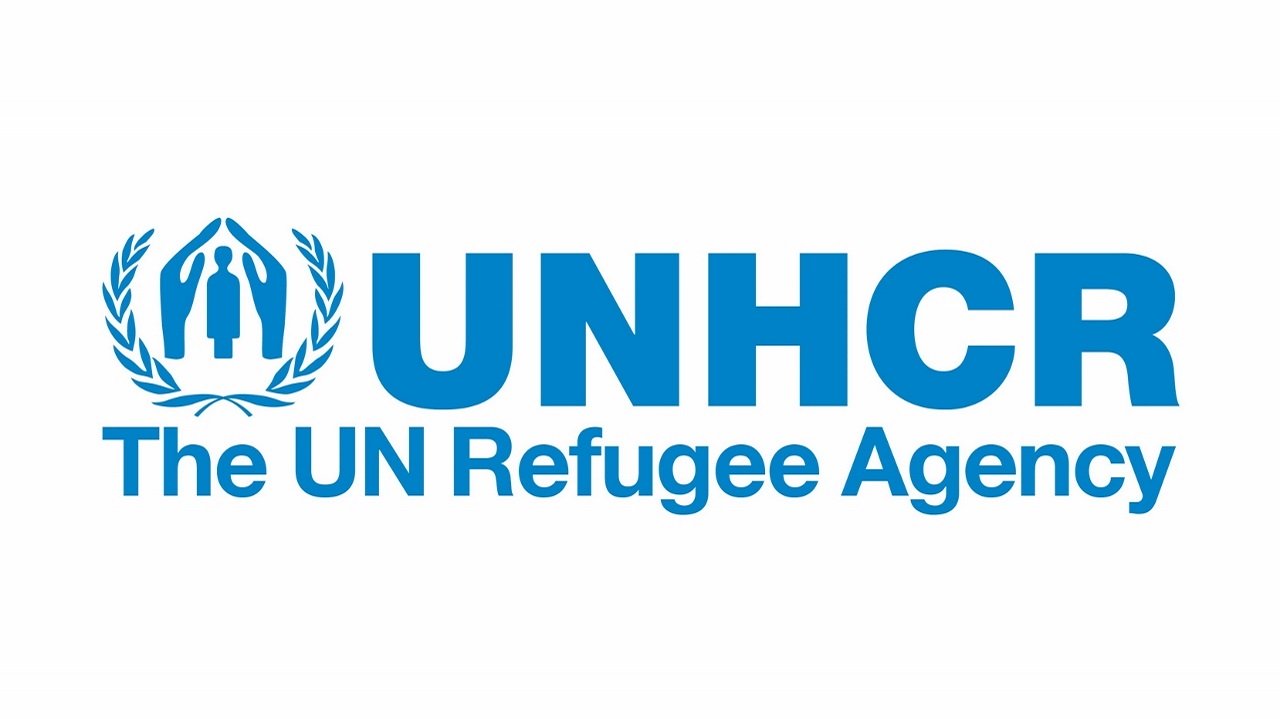|
Mohammed Badran, Member of The Network for Refugee Voices Sometimes, while walking the halls of Amsterdam university, I have to stop and ask myself, “how did I get here?” Five years ago, at the age of 19, I found myself alongside 500 other refugees in a crowded port in Egypt — a long way, physically and emotionally, from beautiful old Damascus, my home. As I boarded a boat I remember the faces of the locals watching the send-off, their looks not of sympathy but of disdain. That was the first time I felt defined by my refugee status. It has since inspired my work to change the way refugees are perceived. Today, a global network of refugees who want their voices to be heard and to play a role in shaping their own futures is emerging. I am a Palestinian-Syrian, a founder of the refugee-led network Syrian Youth Volunteers in the Netherlands (SYVNL) and a member of the Network for Refugee Voices. I am a student and an entrepreneur. I am also a refugee. My journey to “earn” this status has been long. After attempting to travel by sea, I was detained for over a month in an Egyptian prison. When I finally arrived in the Netherlands, I was eager to find a community and a home away from home. Through my university, I met other young Syrian refugees who had endured journeys like mine. We started to meet to discuss our experiences and realised we shared a common yearning: we all felt the need to act and not merely to be the passive objects of other people’s policies. And so SYVNL was born, with the help of refugees and Dutch volunteers. Being a refugee is my experience, not my identity. We are called refugees because we have had to flee war or persecution, but we experience this label as paradox. It is true that we fled our homes in need of protection. Many of us are still going through a lot as we adjust to new environments while dealing with trauma. But all too often we are perceived as passive. And this undermines our agency, our capacity to build new lives, to develop ourselves as individuals and to contribute to the new communities that host us. People regularly ask me what they can do to help refugees. Though well intentioned, this question is problematic because it reinforces the perception that we are helpless victims and mere recipients of aid. What they should be asking is how can they help refugees to help themselves. We need a movement to make the refugee response system participatory and bottom-up — one that sees us for who we are: farmers, students, doctors and engineers, risk-takers who used all their ingenuity to escape war and oppression. To really help refugees be self-reliant they must be listened to and given the chance to participate. Some of the most innovative work in this area is being spearheaded by refugees themselves. SYVNL and the Network for Refugee Voices are two of nine refugee-led networks that are organising the first Global Summit of Refugees in Geneva this week. With support from Independent Diplomat and the Refugee Council of Australia, the summit will bring together more than 80 refugee leaders from six continents to launch an international refugee-led network. We want to connect refugees with each other, as well as host communities, municipal and national governments and international organisations. We want to be part of the solution. We have the experience; we know what works. We want to shoulder our own responsibilities and design effective refugee policies that will benefit everyone, whether at the UN or in local neighbourhoods. The current refugee response is not only failing host communities and taxpayers in donor countries, it is also failing us — the refugees. Mohammed Badran is founder and director of Syrian Volunteers in the Netherlands. Full Article
1 Comment
Sana Mustafa, Founding Member, The Network For Refugee Voices We don’t accept all-male panels on women’s issues, so why do we still discuss refugee policy without refugees, asks entrepreneur Sana Mustafa. Beyond tokenistic inclusion of refugee stories, she argues that meaningful participation requires major institutional shifts. I was recently invited to deliver a keynote address at an event on refugee inclusion. A crowd, dressed in business casual, packed out the event space. The master of ceremonies bellowed over the loudspeaker, “Please join me in welcoming a Syrian refugee to the stage.” I cringed. In a fleeting moment the event organizers had undermined the very project they had set out to address: empowering refugees. I had asked them to introduce me like they would anyone else, by my resume. By introducing me by my legal status, they had stripped me of my agency, further entrenching the narrative of dependent, passive refugees. My name is Sana Mustafa. I am the founder of a consulting company, a co-founder of the international Network for Refugee Voices, and yes, a Syrian refugee. Today’s practice of refugee participation typically equates to a refugee recounting their journey at the beginning of an event. Storytelling can be a helpful tool to shift xenophobic narratives about refugees, but it is not enough. Meaningful refugee participation requires a rethink of the international humanitarian support and development landscape. We must uproot the traditional, top-down, structure of humanitarian aid and initiate a participatory, bottom-up, approach to refugee policy. Refugees must be given a seat at the table to participate in existing conversations about refugee policy and empowered to create their own spaces. This call for inclusion via participation is not new. We have been fighting for decades for the inclusion of minority groups in conversations about their futures. I would like to believe that gone are the days where an international institution would host a conference on women’s rights without inviting women to participate. However, until now, international discussion on the refugee issue has largely tokenized refugees and attempted to make decisions without refugees themselves having a substantive say. At the United Nations, for example, where countries are negotiating a new global compact on refugees, refugees have been allowed into the negotiation room, but only as observers. I have attended countless panels about the “refugee experience” that had zero refugee representation. Imagine if in this era, there was a women’s rights policy being negotiated where women were allowed to observe, but not speak. Or a panel about the “female experience” without any women. Would we, as global citizens, stand for that? Imagine if in this era, there was a women's rights policy being negotiated where women were allowed to observe, but not speak. There are some organizations that are doing refugee participation well. Oxfam International recently hosted an International Refugee Congress that engaged refugee-led groups and host countries as key actors. WeWork hired refugee consultants to advise on their World Refugee Day campaign on cultural sensitivity. The United Nations Refugee Agency (UNHCR) has formed a Global Youth Advisory Councilof young refugees. Independent Diplomat provides diplomatic advice to refugee leaders to inform their participation in global policy discussions. Some non-governmental organizations, like the Refugee Council of Australia, that have traditionally been responsible for representing refugee views in international policy discussions are instead funding refugees to travel to conferences to represent themselves. Perhaps most inspiring, however, is the initiative refugee-led groups are taking to redefine refugee participation and inclusion. Refugees are leading by example. Next week, a group of over 70 refugee leaders from around the world will descend upon Geneva to convene the Global Summit of Refugees. The summit will be the first ever strategic-level meeting of refugees, run by refugees, in the interests of refugees. Conceived by group of nine refugee leaders from Syria, Colombia, South Sudan, the Democratic Republic of Congo, Myanmar and Afghanistan, living on six different continents, Global Summit refugee participants represent 26 countries of origin and 34 hosting countries. If there is one message that echoes forth from the Global Summit it will be: “Nothing about us, without us.” Full Article The Skoll World Forum Session: ‘Refugees and Migrants: Economic and Social Integration’
In today’s increasingly harsh and divisive political climate, refugees and migrants are often portrayed by politicians as well as policy makers and sometimes even human rights advocates as a ‘burden’ for host states. This is accompanied by a reluctance to receive refugees and asylum seekers, with destination states in the Global North actively seeking to prevent such individuals from reaching their territory through visa regimes, carrier sanctions, offshore detention and pushbacks and pullbacks at sea and on land. But what if the narrative moved away from this? What if refugees and migrants were viewed as being of great value to host states and their communities by providing cultural and social diversity, creating new jobs and businesses, and bringing a much-needed economic boost? Surely this would improve both the lives of refugees and migrants as well as the host communities themselves? These questions were canvassed in yesterday’s panel discussion on Refugees and Migrants: Economic and Social Integration. The panel ‘walked the walk’ on the idea of inclusion, featuring two inspiring young leaders who are also refugees: Sana Mustafa, a Syrian refugee, and Salim Salamah, a Syrian Palestinian refugee, who are both Founding Members of the Network for Refugee Voices. Susan Myers, Senior Vice President of the United Nations Foundation opened the panel, highlighting its focus on ‘personal experiences, local solutions and more effective policy making’, which in doing so, ‘will make a strong business case that migrants are to be invested in and partnered with’ and outline a model that ‘starts with the power of proximity that brings people together’. Effective Social and Economic Integration The presence of refugees and other migrants can be a win for host communities as well as the individuals themselves. Panelist Robert Annibale, Global Director of Inclusive Finance Citigroup Inc, encouraged us not to think of refugees as merely destitute, but as educated and skilled individuals full of potential. Uganda is often cited as the role-model for refugee integration through an approach that upholds basic rights, including the right to work, to attend school and move freely within the country. Refugees are also given land for resettlement and cultivation and can participate in training on running a small business. As Kelly T Clements, Timothy Shoffner and Leah Zamore highlight, ‘Uganda has chosen inclusion over marginalization’, which fosters self-reliance and resilience and empowers refugees to benefit their communities. The Ugandan approach also challenges the popular assumption that the presence of refugees takes jobs away from locals. A Refugee Studies Centre report referenced by panelist Premal Shah, Co-Founder and President of Kiva, shows that 40% of refugees who were employers created and provided work for Ugandan nationals. Read the full article. REFUGEE VOICES Sana Mustafa, a refugee who fled Syria in 2013 and now lives in the United States, said a first step in getting refugee policy right is to give those on the move a voice in decisions made about them. With other refugees, she last year set up the Network for Refugee Voices, a coalition of 40 refugee organisations with the motto: “Nothing about us without us”. “Development projects for 50 years for refugees have been done without us,” said Mustafa, whose father was arrested and disappeared in Syria and whose mother and two sisters are now scattered across Turkey, Jordan and Germany. The network is taking part in the design of a new U.N. compact on refugees now under negotiation. Read the Full Article Sana Mustafa, Founding Member, Network for Refugee Voices The zero draft of the Global Compact on Refugees in its current state reads like a list of recommendations and best practices, without suggesting actionable or concrete solutions. The draft calls on the international community to meet the “needs” not “rights” of refugee and host communities and stays away from issues like refugee human rights and access to justice. The Programme of Action makes extensive recommendations related to “voluntary repatriation” but nonrefoulement is not mentioned in the document. The Compact must reinforce and add to the refugee protection regime in place and take a rights-based approach to new solutions. As The Network for Refugee Voices, we are happy to see that the zero draft recognizes the need to consult refugee communities in these processes; this is a step in the right direction, but it’s not enough. Refugee self-reliance requires refugee participation in designing and implementing these policies; we should be empowering refugee-led initiatives and including refugees in decision-making. We acknowledge our responsibility to do our part to make this document as ambitious as possible. We look forward to collaborating with member states and stakeholders to ensure the GCR is practical, effective and sustainably implemented. Read the Full Article [24 January 2018] A delegation of the Network for Refugee Voices concluded a two-day visit to Geneva where they spoke at the Steering Committee for Humanitarian Response’s high-level conference on ‘Participation is Power: Keep it, Share it or Give it away?’ and met with policy makers, humanitarian organizations and the UN Refugee Agency. Throughout the visit, the representatives of the Network for Refugee Voices pressed for refugee participation in the upcoming negotiations of the Global Compact on Refugees. In particular, the Network for Refugee Voices reiterated to the representatives from UN Member States that only direct input from refugees can ensure sustainable and effective refugee policy that will benefit refugees as well as host-communities. Commenting on the visit, Osama Salem, founding member of the Network for Refugee Voices said: “We are pleased to finally see Member States calling for the participation of refugees in the discussions that affect them the most. We hope other key stakeholders will soon follow their example and ensure that refugee-led organizations’, such as the Network for Refugee Voices, voices are heard in refugee policy negotiations”. During the Conference - facilitated by the Steering Committee for Humanitarian Response - which focused on the implications of a shift in power away from organisations providing humanitarian assistance to people affected by crisis, the Network for Refugee Voices set out its recommendations on how to reform the humanitarian system and the humanitarian response to the refugee crisis, to prioritize the empowerment of beneficiaries. “Participation must be seen as a human right. INGOs must shift their focus to engage affected communities; beneficiaries must be represented at all levels of policy design, implementation and coordination. This human rights based approach will not only increase the impact of programs, but will also improve integration,” concluded Adam Elsod, founding member of the Network for Refugee Voices.
The Network for Refugee Voices recommendations for the Global Compact on Refugees can be found in the Network’s non-paper which was submitted to UNHCR during the tenth annual High Commissioner’s Dialogue on Protection Challenges in December 2017 to ensure that the Global Compact on Refugees and its Programme of Action are ambitious, effective and sustainable. The horrors of Aleppo continue to shock the world and the war has displaced millions. Syrian activist Mohamed Alsaud calls on the EU to involve the Syrian diaspora and the refugees themselves in efforts to tackle the issue at stake. Read Full Article On 10 July, the United Nations Refugee Agency (UNHCR) held the first thematic discussion of the Global Compact on Refugees. The Compact will be adopted by the United Nations General Assembly in September 2018 and impact the lives of refugees around the world. Iyad Kallas, Syrian refugee, representative of the Network for Refugee Voices, and the only refugee to address the assembly called for inclusive discussions on refugee policy. Read Full Article A year after the New York declaration, Refugees Deeply asked a delegation of refugees what impact it has had so far and where it has fallen short.
Read Full Article Read the NRV's Declaration: http://www.unhcr.org/5975a8a82e5.pdf
|
